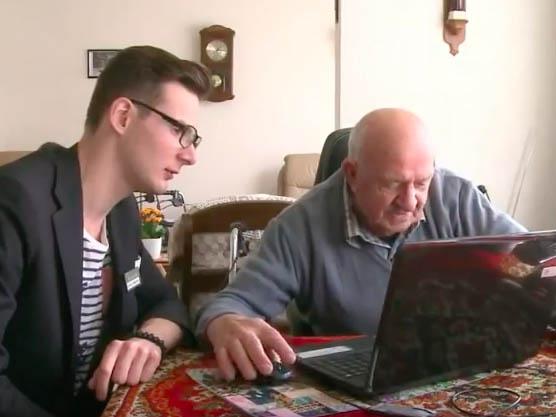Why some Dutch university students are living in nursing homes
What students can learn from time spent in care homes

In today’s society both young and old increasingly find themselves living in a bubble of like-minded and similar-aged peers. This is especially true of university students who leave home at 18 to live with people of the same age – who have quite often had similar life experiences.
Given this, the decision by a Dutch nursing home to run a programme providing free rent to university students in exchange for 30 hours a month of their time – “acting as neighbours” with elderly residents – is unusual.
The programme has seen students in their early twenties sharing lives with residents in their eighties and nineties. As part of their volunteer agreement, the students also spend time teaching residents new skills – like how to email, use social media, Skype, and even graffiti art.
Reducing loneliness
Behind Humanitas Deventer’s “exchange” programme is research showing that reducing loneliness and social isolation improves wellbeing and extends life expectancy in older people.
And though research on the impact on students seems yet to be explored, from my own experience of running a similar project at the University of Exeter, I know that it is overwhelmingly positive – giving young people a sense of connecting with older generations, and significantly increasing the likelihood that they will continue to volunteer after university.
Since 2011 student volunteers from the university’s English and Film departments have donated their time to bring conversation, literature, and friendship to the residents of more than 10 residential care homes across the city. In that time around 250 volunteers have reached out to more than 500 elderly residents, including many dementia sufferers.
Reading between the lines
The Care Homes Reading Project draws on the natural skill set of its target volunteer community – which includes a love of reading and an understanding of the power of literature to impact lives positively.
Research shows reading poetry with dementia sufferers – many of whom learned poetry by heart when they were younger – brings comfort and reassurance through hearing and reciting familiar verses.
Rhythm and rhyme bring a sense of order and predictability and, as this project has seen first-hand, poetry can spark memories.
As one care home manager put it, residents regain a sense of themselves as “a whole person, past and present”. And in one brilliant example, a 100-year-old resident found a shared play-reading session with one student volunteer revived long-buried leading-lady speeches once delivered when she was an actress.
Shared passions
Our experience in Exeter has shown that students can help to supplement the quality of care in homes by providing relief for overstretched staff. And residents typically respond with enthusiasm to the novelty of younger visitors and to the creativity students bring to their sessions.
Residents are also encouraged to be creative by writing their own poetry. English students offer expertise in selecting and discussing appropriate literature, and show sensitivity to the emotional responses that language can trigger.
Many students find the visits often evolve into wide-ranging conversations and the discovery of other activities that bring happiness and interest to the residents. One student now not only visits a care home to read but also to hold ballet classes. And in the same home other residents have made use of students’ language skills, holding French and German conversation sessions.
Volunteer students look forward to their weekly visits. They find it is a space where they can share poetry and stories – away from the demands of assessments. And many have said that it reminds them why they chose to study English literature in the first place.
Students also learn how past generations read the very same poems in surprisingly different ways. They see first-hand how literature stays with us throughout life. And how the experience of shared reading helps to overcome the social and ideological disconnect between generations that plagues contemporary society.
Breaking boundaries
The moral health of a society is plainly visible in the way it treats its most vulnerable members, especially the aged. The government recently announced that universities will be required to demonstrate their commitment to enhancing social mobility by establishing or supporting schools, so why not also mobilise the resources universities offer to enhance opportunity and wellbeing at the other end of life’s spectrum?
The largest resource universities possess is the student body – a force with time, energy, few domestic responsibilities, and a desire to use their developing skills to make a positive difference in the local community.
Our reading project in care homes shows how both young and old can benefit from this type of arrangement. So just like the Dutch, it would be great if universities in the UK could also look to reduce the cost of tuition fees or accommodation in exchange for meaningful social investment to get more people young and old spending time together.
This article first appeared on The Conversation (theconversation.com). Johanna Harris is a senior lecturer in English, at the University of Exeter
Join our commenting forum
Join thought-provoking conversations, follow other Independent readers and see their replies
Comments
Bookmark popover
Removed from bookmarks